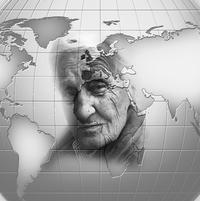by Mark Gorman
This year marks a major milestone. It was seventy years ago that the United Nations first agreed the Universal Declaration of Human Rights, with its commitment to the idea that, in the words of Article 1, ‘All human beings are born free and equal in dignity and rights’. Agreed in a post-war world where, in the words of the Declaration’s preamble, the world’s conscience had been outraged both by acts of barbarity and by widespread poverty, the Declaration commits not only to freedom of speech, but to freedom from fear and want as well.
Seventy years on, in a world which seems to be in retreat from the universal principles enshrined in the UN’s Declaration, its vision seems to be needed more than ever, its ideals as inspirational and ground-breaking as they were in the post-war world. Yet there remain ways in which even this ground-breaking document falls short. While asserting the equality of everyone, it has, for instance, nothing to say about the discrimination suffered by people living with disability, nor of people in later life. And while the UN responded to a vigorous decade-long campaign by people with disabilities in passing a Convention on the Rights of Persons with Disabilities, we still await action on age discrimination. Just one of the nine human rights treaties passed since the UDHR explicitly prohibits age discrimination.
As a result, older people’s human rights are invisible, not only in international legislation, but also in national laws and policies, and ageism remains a largely unchallenged part of our everyday lives. As my HelpAge International colleague Bridget Sleap says, discriminatory policies are pervasive. ‘We see pensions that are not universal or guaranteed in law, with pension values so low that older people are forced to be financially dependent on others, or in mandatory retirement ages that exclude older people from the workforce. Age barriers limit older people’s access to health care, and financial services such as insurance. And older people rarely have choice or control over the care and support they may need to live independently. It is often unavailable, unaffordable and not guaranteed in law’. Seventy years on from the UDHR, older people say they are stereotyped as unable to make their own decisions, incompetent and a burden.
Last month in New York the UN’s Commission for Social Development (CSD) reviewed progress sixteen years on from the launch of the UN International Plan of Action on Ageing. It was an opportunity taken by civil society activists to talk about their experience of the impact of the Madrid Plan. Dr. Shashi Tyagi is a co-founder of Gravis, an NGO which works with communities in the Thar Desert region of the state of Rajasthan in northern India. Shashi spoke to the Commission about the discrimination suffered in her community by older women, especially those from lower castes, because of traditional attitudes and beliefs. While in India the law permits women to hold property, local traditional practice rarely allows this; women are rarely able to go out alone, and an older woman visiting a doctor like Shashi needs to be accompanied by a relative to speak for her.
It is not only in traditional communities that older women (and men) suffer discrimination, and we should not be under any illusion as to the extent of ageism in many societies. As Shashi said, she was surprised to learn how from other delegates at the UN globally pervasive age discrimination is. Just see how many media stories featuring old age time-bombs are on the web. Nevertheless, human rights law does not stand still, but continues to change in response to emerging forms of discrimination and deprivations of dignity as they are exposed, or as we better understand them. The failure of the international human rights system to address our rights in older age has been acknowledged at the UN, and the need for a new UN convention on the rights of older people is now firmly on the agenda.
To respond to these concerns, in 2010 the UN established an Open-ended Working Group on Ageing (OEWG), giving it the remit to strengthen the protection of older people's rights by reviewing existing rights instruments, identifying gaps in protection, and exploring the feasibility of new laws. Civil society organisations have been actively involved with this process, supporting older people who take part in the OEWG and submitting evidence from around the world to demonstrate why their rights need protecting. To date, the OEWG has clearly established that there are gaps in the international human rights framework with regard to older people's rights. Support for a new convention is growing among member states from every region of the world, as well as in the UN system itself . National human rights institutions were granted participation rights in the OEWG for the first time at its seventh session in December 2016. The OEWG also decided to focus its discussions on what the content of a new instrument might be before deciding what type of instrument would be most suitable. The ninth OEWG will take place in 2018. It will look at the content of the rights to non-discrimination and equality, and to freedom from violence, abuse and neglect in more detail. It will also discuss new topics: autonomy and independence, long-term care and palliative care. HelpAge is consulting with older people to find out their experience of rights in these areas.
Our rights do not change as we get older. We remain free and equal in dignity and rights whatever our age. 2019 will mark another milestone – it will be fifty years since the American gerontologist Robert Butler coined the term ‘ageism’, and it has since become a key organising idea for both researchers and practitioners in ageing, as Andrew Achenbaum makes clear in this potted history of ageism. Nevertheless, despite the work of Butler and his successors, age prejudice remains a key infringement of the rights of people in later life. What better way to celebrate 70 years of the UDHR than recognition of this in a UN Convention on the Rights of Older People?
About the Author
Mark Gorman is a Visiting Fellow at OIPA. He is Senior Policy Advisor at HelpAge International. For more information on social pensions around the world visit HelpAge’s Pension watch website.
Comments Welcome
We welcome your comments on this or any of the Institute's blog posts. Please feel free to email comments to be posted on your behalf to administrator@ageing.ox.ac.uk or use the Disqus facility linked below.
Opinions of the blogger is their own and not endorsed by the Institute
Comments Welcome: We welcome your comments on this or any of the Institute's blog posts. Please feel free to email comments to be posted on your behalf to administrator@ageing.ox.ac.uk or use the Disqus facility linked below.













